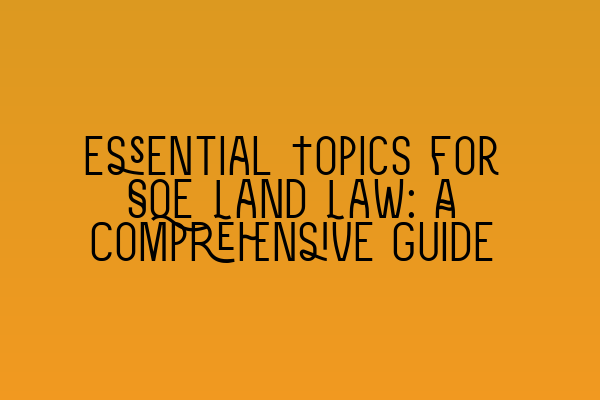Essential Topics for SQE Land Law: A Comprehensive Guide
Welcome to our comprehensive guide on essential topics for SQE Land Law. As a solicitor specializing in property law, it is crucial to have in-depth knowledge of land law. The SQE (Solicitors Qualifying Examination) is a new centralised assessment that aspiring solicitors must pass to qualify in England and Wales. Understanding the key topics covered in Land Law is crucial to excel in the SQE examination.
In this guide, we will explore the essential topics that you need to focus on for Land Law in the SQE examination. By mastering these topics, you will be well-prepared to tackle the Land Law questions and have a strong foundation for your future legal practice.
1. The Concept of Land
The concept of land is fundamental in Land Law. It is crucial to understand what constitutes land and how it is categorized in legal terms. This includes understanding the difference between freehold and leasehold, possessory and non-possessory rights, and the different types of interests that can exist in land.
To dive deeper into the concept of land and its legal implications, you can check out our comprehensive article on The Concept of Land in SQE Land Law.
2. Rights and Interests in Land
Understanding the different rights and interests that can exist in land is vital for a property lawyer. This includes legal concepts such as easements, covenants, mortgages, and equitable interests. It is essential to know the elements required for the creation and enforcement of these rights and how they affect landowners and occupiers.
For a deeper understanding of rights and interests in land, we recommend checking out our article on Rights and Interests in SQE Land Law.
3. Co-Ownership and Trusts
Co-ownership and trusts are significant aspects of Land Law that every solicitor should be familiar with. This topic involves understanding the different forms of co-ownership, including joint tenancy and tenancy in common, and the resulting legal rights and obligations of co-owners. Additionally, knowledge of trusts and the legal principles governing them is crucial for advising clients on property matters.
For a comprehensive overview of co-ownership and trusts, refer to our article on Co-Ownership and Trusts in SQE Land Law.
4. Leases and Tenancies
Leases and tenancies are essential areas within Land Law that require a thorough understanding. This includes knowledge of the different types of leases, the obligations of landlords and tenants, the termination of leases, and the recovery of possession. Being well-versed in these areas will enable you to provide practical advice to clients regarding their leasehold interests.
For a comprehensive guide to leases and tenancies, browse through our article on Leases and Tenancies in SQE Land Law.
5. Registration and Conveyancing
Registration and conveyancing are critical aspects of Land Law that solicitors must be proficient in. This includes knowledge of the land registration system, the process of buying and selling land, the role of the Land Registry, and the legal requirements for validly transferring ownership of land. Mastery of this topic will assist you in navigating complex property transactions.
To delve deeper into registration and conveyancing in Land Law, read our article on Registration and Conveyancing in SQE Land Law.
Conclusion
In conclusion, understanding the essential topics for SQE Land Law is paramount for aspiring solicitors. By focusing on the concept of land, rights and interests in land, co-ownership and trusts, leases and tenancies, and registration and conveyancing, you will be well-prepared for the SQE examination and future legal practice.
For more comprehensive preparation resources and courses for both SQE 1 and SQE 2, visit our website at SQE 2 Preparation Courses and SQE 1 Preparation Courses. Stay updated with the SRA SQE Exam Dates by checking out our article on SRA SQE Exam Dates.
